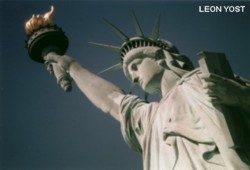 |  |  |
|
| ||
 |  |  |
 |  |  |
|
| ||
 |  |  |
|
|
originally appeared in The New York Times on Monday,March 26, 2001.
By DAVID M. HALBFINGER
TRENTON, March 25
Court documents suggest that Mr. DiFrancesco himself learned of her firing,
if not the reasons for it, within weeks after her dismissal.
Isabel Miranda, who was named treasurer of New Jersey on March 19 and took
over as acting treasurer on Friday, was director of trusts and estates for
Citibank's private banking unit until 1996, when, the co-workers say, she was
forced to resign and immediately escorted from her office in the Citicorp tower
in Midtown Manhattan.
The co-workers said Ms. Miranda was fired after auditors found evidence that
she and Donald R. Browne Jr., an executive in Citibank's San Francisco office
who later transferred to New York, had charged the bank for frequent
cross-country trips to visit each other and for trips together to places like
Palm Beach, Fla.
Through a spokesman for Mr. DiFrancesco, Ms. Miranda denied today that she
had been fired from Citibank and said she had left voluntarily because of a
dispute with her boss.
But a former colleague said that shortly after her departure, Ms. Miranda
said that she felt railroaded, that her trips to California for Monday meetings
always began the weekend before so she could take advantage of cheaper air fares
for Saturday night stays. But, the colleague said, Ms. Miranda said she had
already signed paperwork with Citibank that left her powerless to protest.
According to court records, Ms. Miranda, then married to Henry A. Mazzucca,
began an affair with Mr. Browne, who was then married with two sons, on or
before September 1993. She divorced Mr. Mazzucca after 17 years of marriage on
June 5, 1995, and married Mr. Browne -- whose own divorce had become final two
weeks earlier -- on June 28 in Palm Beach, according to their Florida marriage
license.
The two now live with Ms. Miranda's two teenage daughters in Scotch Plains,
N.J., less than a mile from Mr. DiFrancesco's home there and a five-minute drive
from Mr. Mazzucca's in Fanwood.
Co-workers said Ms. Miranda was dismissed around Labor Day 1996. A colleague
who was then a vice president at Citibank said Ms. Miranda was made to leave the
Citibank building without even her handbag after being dismissed by Franklin G.
Burnside, then the director of private banking. Mr. Browne, who rushed outside
to console her, returned to his office and was immediately fired in a similar
fashion by Mr. Burnside, several co-workers said.
Mr. Burnside, visited on Saturday at his home, would not comment. But his
chief of staff at the time, Philip M. Butterfield, who is now the chief
administrative officer of the Bank of Bermuda, said by telephone tonight that
Citibank had concluded that Ms. Miranda and Mr. Browne had shown "lapses in
judgment" and that their departures were a "byproduct" of that conclusion.
Ms. Miranda's other former co-workers, including executives and support staff
members, several of whom are still at Citibank, all spoke on the condition of
anonymity for fear of reprisal against themselves or their employers. The state
treasurer oversees the investment of billions of dollars in state funds with
private institutions.
Ms. Miranda's name was added on Friday to a list of nominations to be
considered for confirmation on Monday by the State Senate Judiciary Committee.
When he nominated Ms. Miranda on March 19, Mr. DiFrancesco asked that the Senate
confirm her by the end of the month, an unusually short deadline.
Visited at their home this afternoon, Mr. Browne said Ms. Miranda was too
busy to come to the door. He would not comment and referred questions to Mr.
DiFrancesco's office.
Mr. DiFrancesco's chief spokesman, Tom Wilson, said Ms. Miranda denied today
that she had been fired. "She and her supervisor had a significant disagreement
that only grew in its intensity over time and resulted in a decision that they
could no longer work together," he said. He confirmed that Ms. Miranda had been
escorted to the street by a bank personnel director, but said the action did not
constitute an ejection from the premises.
But documents from Mr. Browne's California divorce file, including his own
settlement agreement with Citibank, corroborate much of what his and Ms.
Miranda's co-workers recall about the couple's abrupt departure from the bank.
Mr. Browne's settlement agreement with Citibank -- which the co-workers say
mirrored Ms. Miranda's -- shows that he received a six-month severance package,
his securities license was terminated without any reference made to
improprieties in documents filed with securities regulators, and he was paid
$10,000 a month until Feb. 28, 1997.
He was allowed to retain his Citibank telephone number and was given a letter
of reference by Citibank. In return, he waived all rights to sue for wrongful
termination, and both he and the bank promised to say nothing about the reasons
for his departure to anyone but his accountant and family members unless legally
compelled to.
Mr. Browne, who had worked at Citibank for nearly 30 years, signed the
settlement agreement on Nov. 26, 1996. It was notarized by Mr. DiFrancesco, one
of his wife's closest friends.
Mr. Wilson acknowledged today that Mr. DiFrancesco notarized both Mr.
Browne's and Ms. Miranda's severance agreements, but said Mr. DiFrancesco did
not actually read them.
Mr. Browne's settlement with Citibank also stated that he had resigned. But
in a March 26, 1997, motion to modify his family support payments, filed in
Superior Court in Contra Costa, Calif., Mr. Browne stated repeatedly that in
truth, he had been fired.
"Had I not signed an agreement not to sue my employer in exchange for
'severance pay,' I would have been left with no income from Sept. 23, 1996,
onwards," he wrote.
Mr. Wilson said Mr. Browne used that term only on the advice of his divorce
lawyer, but when pressed he did not disavow it. "He says, 'When you have a
disagreement with your employer, firing and quitting occur simultaneously,' "
Mr. Wilson said after speaking to Mr. Browne. "Was he fired? Sure, and he also
quit."
Mr. Wilson also said there were "material differences" between Ms. Miranda's
and Mr. Browne's settlements with Citibank, but did not elaborate.
"I find it offensive to engage in a rumormongering campaign by giving a
detailed response," he said at one point. He said Ms. Miranda acknowledged that
her expense reports had been audited -- after she left, he said -- but that this
was "common practice for a person in her position" and that nothing "irregular
or improper" was found.
Mr. Wilson also objected to what he called "nameless, faceless accusations"
and asserted that were they true, "Citibank would have pursued them to the
fullest extent." He added that such accusations "also would have been uncovered
as part of the extensive background check that all nominees undergo." But he
acknowledged that such background checks, performed by the state police, do not
carry subpoena power.
In January 1997, Ms. Miranda was hired as a senior vice president at U.S.
Trust Company of New Jersey in Princeton Junction, where she oversaw a smaller
group of employees, and managed a much smaller portfolio, than she had at
Citibank, according to former co-workers who say they have spoken to her.
A U.S. Trust spokeswoman on Friday would not comment on Ms. Miranda's
responsibilities there. But a fellow banker who has known Ms. Miranda for years
described her job there as "seven notches down" from her old position, where she
oversaw the entire nationwide trust and estates division of Citibank's private
bank, which was billed as the largest private bank in the world outside
Switzerland.
Mr. Browne was hired in June 1997 by the Bank of America, according to his
divorce filings, but was let go in November 1998 in a reorganization after Bank
of America merged with NationsBank. He was hired by Ashbridge Investment
Management, in Philadelphia, as a senior vice president in February 1999.
Another potential issue for state senators to consider may be the terms of
Ms. Miranda's departure from U.S. Trust to join the DiFrancesco administration.
Mr. Wilson confirmed today that Ms. Miranda had taken an unpaid leave of
absence from U.S. Trust, meaning that she will be allowed to reclaim her job
after ending her government service. He said that she had recused herself from
anything to do with U.S. Trust and that her leave and the recusal had been
approved by the director of the state's Executive Commission on Ethical
Standards, Rita Strmensky.
As acting treasurer, Ms. Miranda oversees all bond issues by state agencies.
The Charles Schwab Corporation, which bought U.S. Trust last year, has recently
been expanding its role in the underwriting of municipal bonds. It helps to
distribute bonds issued by state and local government agencies, including the
New York State Thruway Authority, and the company has said it hopes to become a
lead underwriter of bond issues.
Ms. Miranda's stint as treasurer, if she is confirmed, could be brief, or it
could last for years. Mr. DiFrancesco, a Republican, is serving out the last
year of former Gov. Christie Whitman's term, but he is a leading candidate for a
full four-year term in this year's elections.
According to Ms. Miranda's former co-workers, internal auditors began looking
at her expenses after a junior employee in her department was caught falsifying
expense reports by adding digits to amounts that had already been approved by a
vice president. The employee was fired in the fall of 1995, they said.
In the months that followed, according to a co-worker, Ms. Miranda was asked
to justify numerous trips to San Francisco and other places, including many on
which she was accompanied by Mr. Browne. The co-worker said Ms. Miranda traveled
roughly once every three weeks to San Francisco, always first class.
One trip that appeared to capture the auditors' attention, the co-worker
said, was to Palm Beach in early 1995. Ms. Miranda's expense report included a
$164 fee for a car service used by Mr. Browne between his home in Walnut Creek,
Calif., and the San Francisco airport, the co-worker said, and auditors appeared
to question why Mr. Browne had not submitted the expense on his own report.
The trip was nominally to attend the birthday party of a wealthy client in
Palm Beach, the co-worker said, but Ms. Miranda and Mr. Browne also took care of
a personal matter. They stayed at the Brazilian Court Hotel in Palm Beach, and
made arrangements for a small wedding several months later, the co-worker said.
They were married there on June 28, 1995.
Ms. Miranda and Mr. DiFrancesco have been good friends for years,
acquaintances say. Mr. DiFrancesco swore her into the New Jersey bar when she
passed its exam, and in 1992 he named her to the commission that redrew New
Jersey's Congressional districts. She was appointed to the board of the
University of Medicine and Dentistry of New Jersey in November 1995, and named
the board's chairwoman in January 1998.
In nominating her for treasurer, a cabinet position, Mr. DiFrancesco noted
Ms. Miranda's "life experience" as a Cuban native and her leadership ability.
"This is a proud day for New Jersey, because Isabel Miranda is the ideal
person to get the job done," he said. "She'll be an outstanding treasurer."
GRAPHIC: Photo: Isabel Miranda, who former co-workers say was dismissed from
Citibank, met with Acting Gov. Donald T. DiFrancesco last Monday after he
announced that he was nominating her to be state treasurer of New Jersey. (Laura
Pedrick for The New York Times)(pg. B4)
Acting Gov. Donald T. DiFrancesco's nominee for state treasurer was fired
from a high-level job at Citibank after internal auditors confronted her with
evidence indicating that she had used her expense account to pay for thousands
of dollars in personal travel while having an extramarital affair with a
co-worker in California, according to current and former employees of the bank.
 Your Ancestors' Story |
 Bruce Springsteen's Jersey Shore Rock Haven! |

|
UrbanTimes.com |